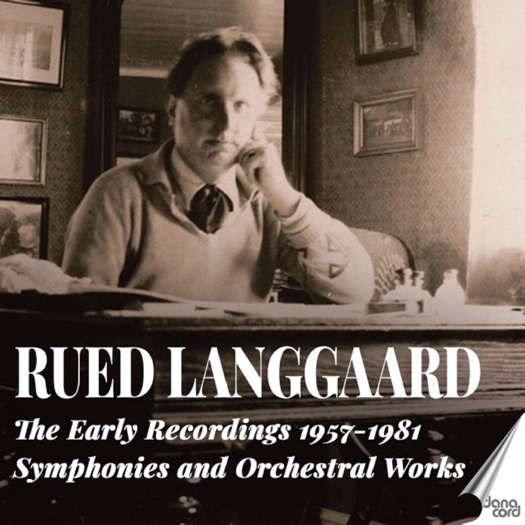 WORD SEARCH: Can you solve Allan Rae's classical music word search puzzles? We're currently publishing one per month.
WORD SEARCH: Can you solve Allan Rae's classical music word search puzzles? We're currently publishing one per month.
ARTICLES BEING VIEWED NOW:
- Régine Crespin
- Hector Berlioz
- Ruth Railton
- Marián Varga
- Marina Koshetz

A Curate's Egg
GERALD FENECH strongly recommends early recordings of orchestral music by Rued Langgaard
'... performances are consistently uplifting ...'
When one talks about Denmark in musical terms, the composer that readily comes to mind is Carl Nielsen (1865-1931). And with good reason, because Nielsen broke all musical barriers of the past and forged a new path for twentieth century composers. But during Nielsen's career, many a Danish composer also contributed much to Danish music. Among these none stands out more tellingly than Rued Langgaard (1893-1952). Born on 28 July 1893 in Copenhagen, Rued quickly established himself as a boy genius when at the age of eleven he had a stunning debut as an organist and organ improviser, and at age nineteen he had his first symphony premiered by the Berlin Philharmonic.
Listen — Langgaard: Drapa (On the Death of Edvard Grieg)
(DACOCD 976 CD2 track 1, 0:02-0:59) ℗ 2025 Danacord Records :
In the early 1920s Langgaard experienced a short-lived interest in his symphonic works, where his Nos 2, 4 and 6 and the Music of the Spheres, his most progressive work, were performed in Denmark. Still, an artistic breakthrough did not materialize as hoped, the main reason being on how the composer was viewed. Indeed, Langgaard was regarded with considerable scepticism as being eccentric and introverted, and after he had his opera Antikrist rejected by the Royal Theatre in the mid-1920s, he turned his back on modernism and directed open criticism at Danish musical life.
Langgaard's religious and symbolically coloured perception of music harmonized poorly with the anti-romantic attitude which, inspired by Nielsen, became dominant in Denmark. The composer was side-tracked, and it was only in 1940 that he obtained a permanent position as cathedral organist in Ribe. After his death on 10 July 1952 aged only fifty-eight, it seemed that he would remain a parenthesis in Danish music history. But around 1965 a renaissance for his music set in and really took off in the 1990s. Today, most of his works are recorded and published. His music is also a success internationally; indeed, the opera Antikrist was premiered in 2022 at the Deutsche Oper, Berlin to raving reviews.
Langgaard's music is characterized by an unusually large stylistic variation. His works are often complex and unconventional in their form and are driven by a striving towards expressive, image-creating and visionary expressions.
Listen — Langgaard: Heftigt bevæget (Interdict)
(DACOCD 976 CD2 track 12, 2:28-3:18) ℗ 2025 Danacord Records :
The nine works on this compilation show the full breadth of expression in the composer's music from 1907 to 1951, and this exciting journey which includes, among other orchestral works, Symphonies Nos 4, 6 and 16 and The Music of the Spheres, is full of wonderful twists and turns that stimulate the mind and keep the listener enraptured with a sense of anticipation of what's coming next. These are works that are not easy to penetrate, but repeated listening will certainly lead you to discover the many beauties encapsulated in these scores.
Listen — Langgaard: Das Ende: Antichrist – Christ (The Music of the Spheres)
(DACOCD 976 CD2 track 27, 3:54-4:45) ℗ 2025 Danacord Records :
These recordings were made between 1957 and 1981, so do not expect sound quality to be what we are used to experiencing nowadays. Whatever the case, performances are consistently uplifting and overflowing with an ardour that draws in the listener with a desire to uncover the secrets of Langgaard's musical language and testament.
Listen — Langgaard: Finale (Symphony No 16, Deluge of Sun)
(DACOCD 976 CD1 track 20, 0:00-0:54) ℗ 2025 Danacord Records :
One last recommendation. Before you immerse yourself in this exceptionally imaginative music world, do make it a point to read the wonderfully erudite booklet notes with all their descriptive details on both the music and the history of how Langgaard's career developed during the first half of the twentieth century. A curate's egg to all intents and purposes which still has my strongest recommendation, especially to those who love experimenting with the still many unknown musical territories that crop up from time to time.
Copyright © 22 February 2025
Gerald Fenech,
Gzira, Malta



